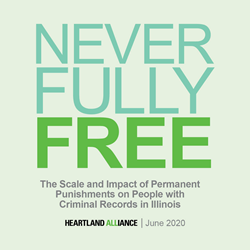Data released today as part of a first-of-a-kind study confirms that more than 3.3 million people in Illinois could be impacted by permanent punishments as a result of criminal legal system involvement given the well-documented inequities that bring into question whether the system actually brings justice to people who come into contact with it. “Never Fully Free: The Scale and Impact of Permanent Punishments on People with Criminal Records in Illinois” illustrates the dramatic number of people who may be living with the stigma and limitations of a criminal record in Illinois. Since the advent of mass incarceration in 1979, there are an estimated 3.3 million adults who have been arrested or convicted of a crime in Illinois. Under current laws, these individuals have limited rights even after their criminal legal system involvement has ended. In fact, the report uncovered a vast web of 1,189 laws in Illinois that punish people with criminal records, often indefinitely.

“Especially after we’ve just commemorated the liberation of enslaved Black people in the U.S. on Juneteenth & are on the cusp of celebrating the 4th of July, we must reckon with the fact that we still have not achieved true freedom for millionsin our communities.” Katie Buitrago Director of Research
CHICAGO (PRWEB)
June 29, 2020
Key findings include:
- There are 1,189 unique permanent punishment laws in Illinois. These state laws collectively act in 1,260 ways impacting people’s access to housing, employment, education and more.
- Nearly 3.3 million adults were arrested or convicted of a crime in Illinois since 1979.
- 982 permanent punishment laws in Illinois create punishments that prevent or hinder access to employment.
- Black people make up 13.8% of Illinois’s adult population but 28.9% of those who acquired arrest or conviction records, 34.9% of people who were convicted of crimes, and 45.3% of people who were convicted of felonies.
- 627,945 adults, or 19.2% of all people with an arrest record, were not convicted of a crime. Some permanent punishments still create barriers for those arrested but not convicted, and arrests can contribute to stigma because they can appear in some background checks and online searches.
- Black women make up 14.5% of all adult women in Illinois, but over a third of all women arrested or convicted of a crime.
See http://www.heartlandalliance.org/neverfullyfree for the full report.
Share article on social media or email:

